Written by: David, Yanz, Deep Tide TechFlow.
April 7, 2025, Sunday.
Bill Ackman tweeted, hoping to suspend the tariff plan for 90 days, and even @ed Trump. Directly naming the president is a taboo on Wall Street. But Ackman doesn't care.
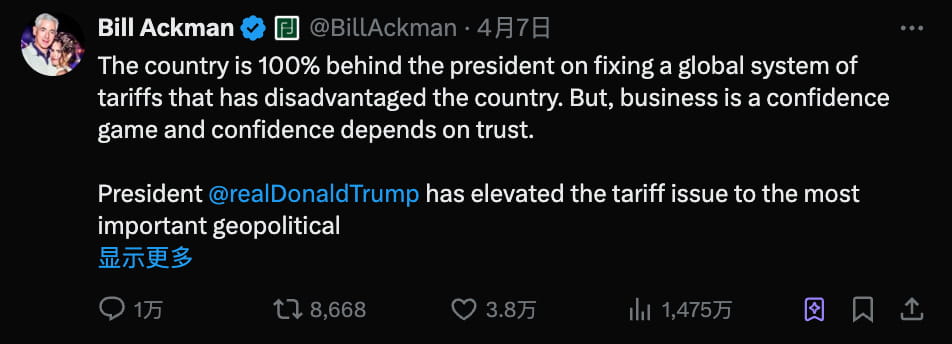
72 hours before this tweet was posted, Trump announced 'reciprocal tariffs' on nearly all trading partners; global stock markets plummeted, and panic spread.
Then, a miracle happened.
On Wednesday morning, Trump announced a surprising decision: to pause the tariff plan for 90 days to allow space for negotiations. This '90-day pause' idea came directly from Ackman's tweet three days earlier.
This coincidence also sparked speculation on social media: Did a White House aide see this tweet and present it to the president?
This is not Ackman's first time successfully 'remote controlling' the White House. In fact, during the Trump era, this hedge fund manager with 1.8 million Twitter followers is practicing a whole new model of political-business relations— no formal position is required, no secret meetings are needed, just enough followers and the right public shout.
From a loyal Democratic benefactor to Trump's 'Twitter strategist,' this is a story about social media, money, and power.
The tariff storm, the benefactor 'correcting' a famous scene.
Before things really happen, no one expected that a tweet could influence the shift in tariff policy.
When Ackman issued that warning that Trump's tariff policy could lead to an 'economic nuclear winter', he was actually engaging in a dangerous gamble— as someone who once openly listed 33 reasons to support Trump, he now surprisingly came out against Trump's tariff policy.
Is this betrayal or awakening?
Just three months ago, he was publicly praising Trump's economic vision on Twitter. Now he is publicly singing a different tune, tweeting in hopes of delaying tariffs for 90 days, and the risks are obvious— the goodwill previously built up along with influence over the White House could both vanish.
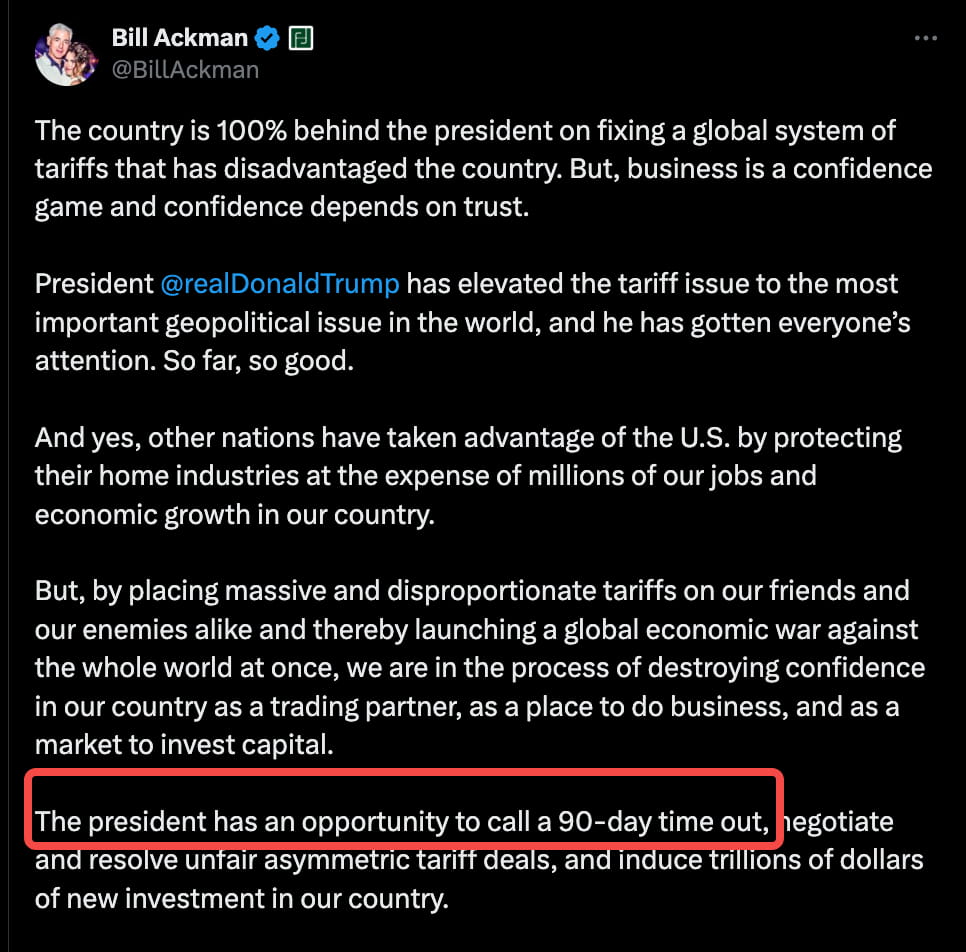
But Ackman bet right.
He accurately grasps Trump's psychology, as this president cares more about the performance of the stock market and public opinion than anything else. Trump just needs a decent way to pivot, without appearing to yield to pressure.
The cleverness of the '90-day pause' proposal is that it gives Trump an out; he can say it is for 'better negotiations'; it also reassures the market that there will be no tariff shocks for at least three months.
On that day, Trump announced a 90-day suspension of tariffs, leading to the largest single-day gain in U.S. stocks in 16 years. The S&P 500 index rose by 4.2%, and the Dow Jones Industrial Average soared over 1200 points.
Ackman kept a low profile about his victory. He simply tweeted: 'Wise decision. The U.S. needs trade, but it must be fair trade.'
This tariff storm lasted a full week, but what it revealed will last much longer.
In the Trump era, benefactors are no longer silent check signers; they are vocal partners and even opponents when necessary. And when opposition voices are loud and unified enough, even Trump must listen.
Twitter governance, a very new political-business relationship
Bill Ackman is handling political-business relations in a more straightforward way: tweeting, @ing the president.
Traditional political-business relationships occur in the dark, in private club dinners, golf course deals, and messages relayed through intermediaries. The public never knows how policies are made, who influenced whom, and at what cost.
Ackman's model, however, is completely opposite— he does not hire lobbyists, arrange private dinners, or even make formal meeting requests. He simply tweets, asking his 1.8 million followers to help him get his message to the White House.
This is not a coincidence, but an inevitability of Ackman's deep understanding of Trump's media consumption habits.
According to several former White House officials, the first thing Trump does every morning is browse the X platform to see who is talking about him and what they are saying. He pays particular attention to accounts with many followers, especially those who have supported him. When these individuals publicly criticize a policy, Trump seriously considers it.
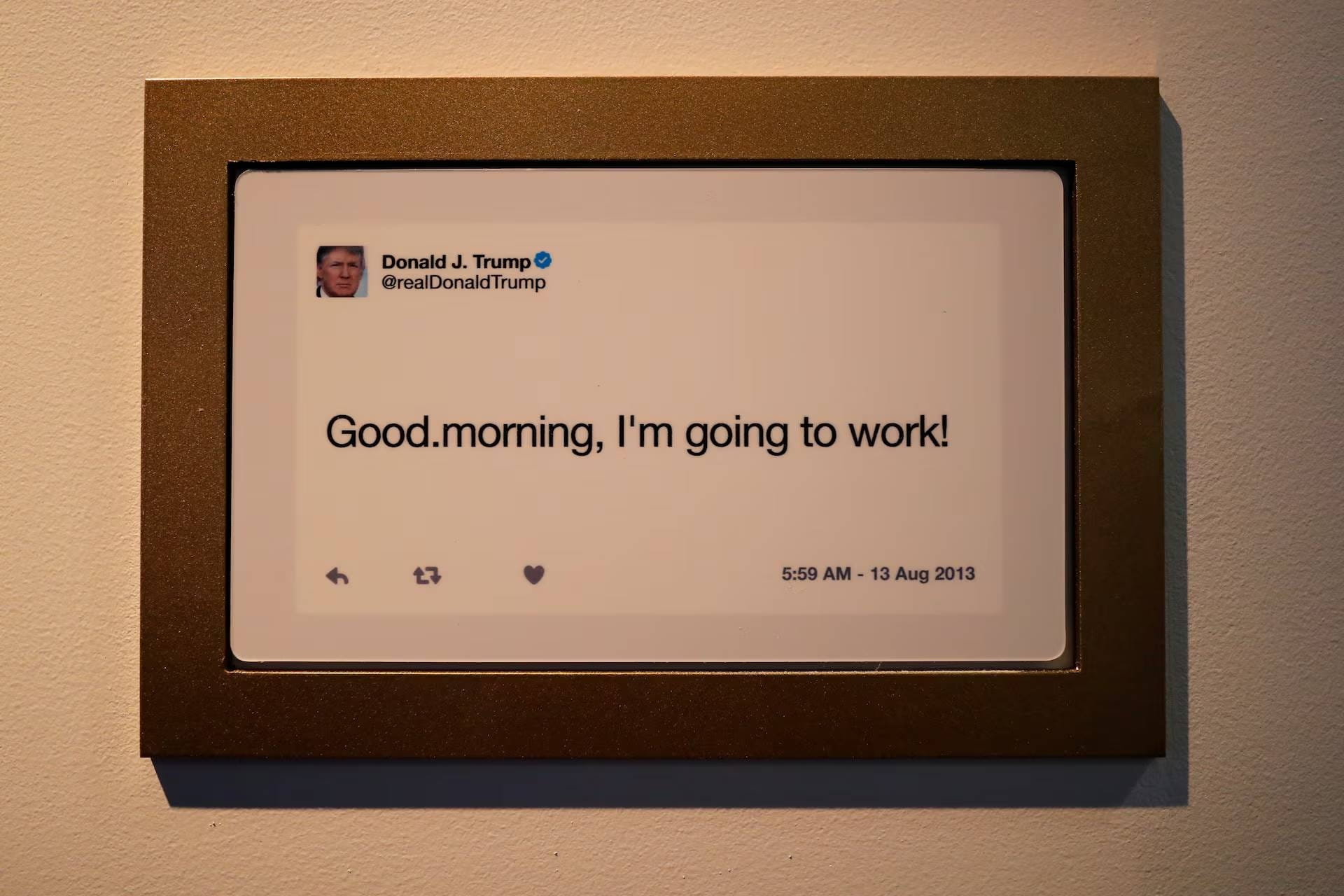
Ackman's Twitter strategy also seems to be carefully designed and operated— usually posted late at night and on weekends, with intense wording but not to the point of rupture, and always tagging the president.
Every lobbying effort is public, and each of his arguments is open to public scrutiny.
This is a kind of honesty that does not conform to the routine, but is extremely reasonable:
Not hiding interests, but rather making it part of the argument— I have a stake in this, so I care more than anyone else about the consequences of this policy.
However, when billionaires can amplify their voices through the number of followers, what are the interests behind the transparency?
The 'radical' with a net worth of $9 billion.
If three numbers were to define Bill Ackman, they should be:
At 58 years old, with a net worth of $9 billion and 1.8 million followers on the X platform. These numbers paint a typical portrait of a Wall Street success story. But Ackman is anything but typical.
In 2014, during a presentation on Herbalife, he argued passionately that this health product company survived solely because its salespeople were forced to buy its mediocre nutritional shakes, which they often found difficult to resell to actual customers.
He accused the company of being a pyramid scheme that is preying on the bottom layer of Americans. In the days following the speech, Herbalife's stock price rose by 25%. He ultimately lost $1 billion on this short trade.
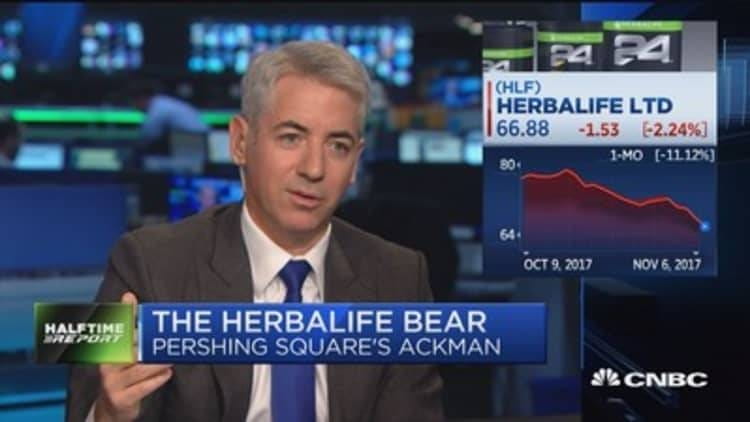
Justice or interests? This is the key question in understanding Ackman.
In March 2020, while the world was still debating whether COVID would be a pandemic, Ackman bought credit protection for $27 million to hedge against market collapse. A month later, this investment successfully turned into $2.6 billion.
Around the same time, he tearfully urged on CNBC to 'shut down America for 30 days,' warning that hotel stocks would 'go to zero.'
Critics say he is deliberately creating panic to profit from his short positions. Supporters say he is warning of risks and fulfilling social responsibility. The truth? Perhaps both.
But there is no doubt he is very smart. While other hedge fund managers are still working quietly, he has realized that the social media era requires new tactics.
He has fashioned himself into a 'social media celebrity' in the financial world— not only frequently tweeting but also arguing with netizens, even participating in a professional tennis match at the age of 59 (though he was eliminated in the first round).
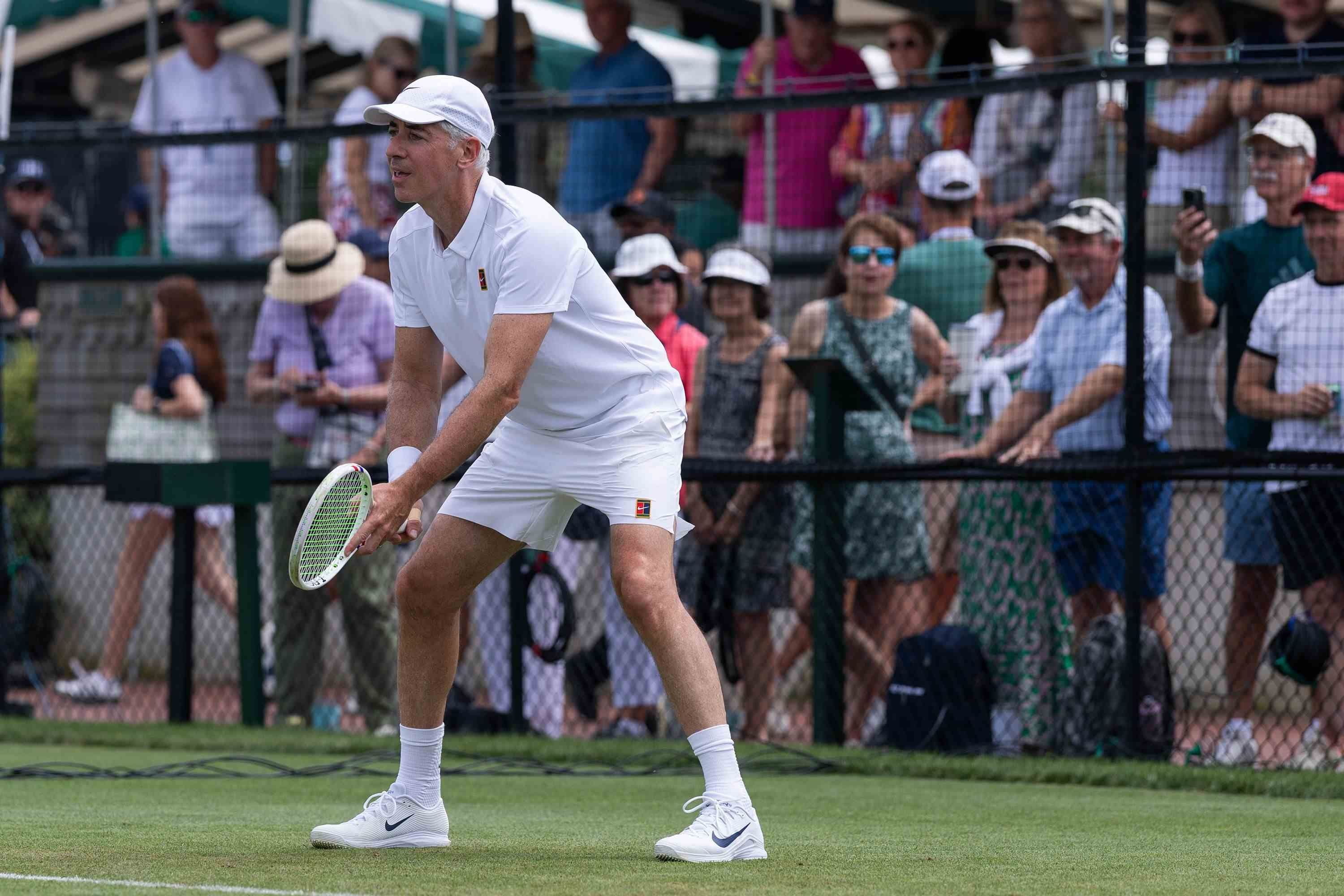
Some say he wants to be the 'next Buffett.' But Buffett never @s the president on Twitter, nor does he publicly confront the president of Harvard University over political positions. He seems more like someone who will do anything to win, yet firmly believes he is doing the right thing.
This contradiction is precisely Ackman's secret weapon for influencing Trump.
An Italian ravioli dinner changed political positions.
Before May 2024, Bill Ackman's political resume reads like a standard Wall Street liberal list. At charity dinners in the Upper East Side of New York, he is a regular at Democratic fundraising events.
Change happened in Los Angeles that same month.
During the Milken Institute Global Conference, Ackman met Elon Musk. The two billionaires, both active on the X platform, found common ground.
Days later, back in New York, Ackman dined with Trump. According to Bloomberg, the main course was Italian ravioli. While the specifics of their conversation are unknown, it clearly left a deep impression on Ackman.
In the 2024 presidential campaign, Ackman has supported several anti-Trump candidates; but after that Italian ravioli dinner, everything changed.
On October 2024, he posted a tweet with an interview video, listing '33 reasons why I support Trump over Harris.'
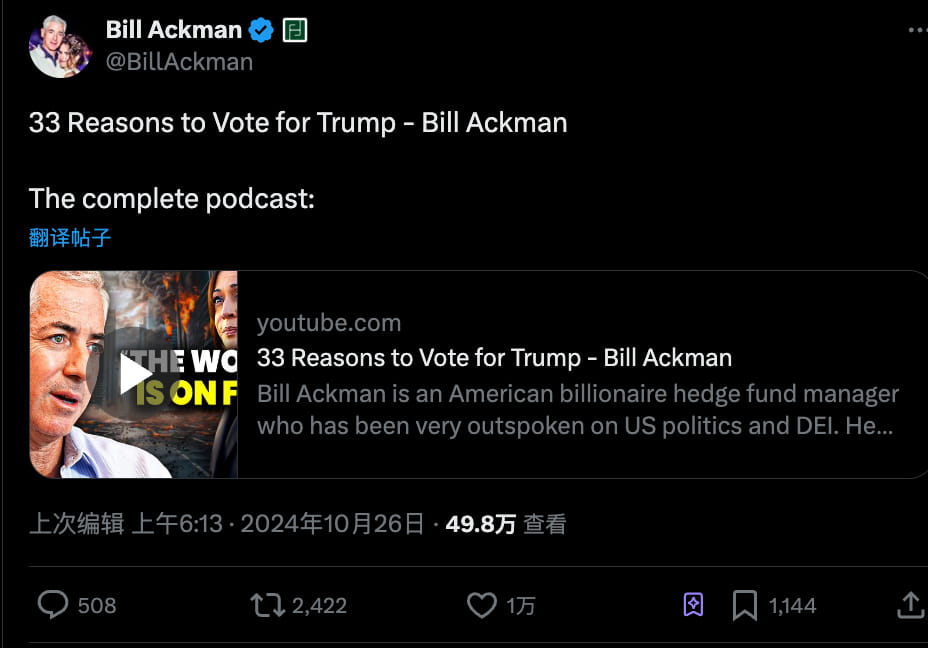
There are many reasons, but insiders have noticed one detail: Ackman's holdings in Fannie Mae and Freddie Mac have exceeded ten years. Trump had pushed for their privatization in his first term, only to say 'not enough time.'
Ackman later tweeted, 'I believe the Trump team will get this done.'
On July 14, after Trump survived an assassination attempt, Ackman publicly expressed support. By January 2025, he even stated he 'did not want any association with the Democratic Party.'
From a Democratic benefactor to a MAGA supporter, Ackman's transformation seems sudden, but it is actually traceable. Just as the interests of Wall Street practitioners come first, Ackman has perhaps always been a trader. He just made a political trade as well.
That Italian ravioli dinner may have been the starting point of this trade.
Privatization of the two housing agencies, a ten-year harvest.
Ackman’s initial foray into Twitter political engagement can be traced back to a year ago when he called for the privatization of the two housing agencies, which hid a painstaking gamble.
Fannie Mae and Freddie Mac, these two government-supported enterprises control nearly half of the U.S. housing mortgage market. During the 2008 financial crisis, they received government bailouts and have been under federal oversight ever since.
For most people, this is just a footnote in financial history. For Ackman, however, it is the biggest bet of his life.
Ackman's Pershing Square fund started building positions in the two housing agency stocks in 2013, when their stock price was less than $2. His logic is simple: these two companies are fundamentally profitable, government regulation is only temporary, and one day they will be privatized again. When that happens, the stock price will surge.
This 'someday' has been ten years in the making.
During this period, the stocks of the two housing agencies remained flat. While other investors left the market, Ackman was increasing his position. By 2024, he had acquired over 115 million shares, becoming one of the largest external shareholders.
On December 30, 2024, Trump was elected but not yet inaugurated. Ackman launched his Twitter blitz.
He directly @Trump in a tweet saying, 'There is a credible path for the two housing agencies to end federal oversight within the next two years.'
He has carefully designed his rhetoric, not discussing his own interests, but only the national interest. 'This will bring the federal government over $300 billion in additional profits,' 'Removing $8 trillion in liabilities from the government's balance sheet.'
The most crucial line: 'Trump likes big deals, and this will be the biggest deal in history. I believe he will accomplish it.' This tweet was viewed nearly 3 million times. Wall Street analysts began to reevaluate the stocks of the two housing agencies.
In February 2025, signals began to emerge.
New Housing and Urban Development Secretary Scott Turner stated at the confirmation hearing that assisting the privatization of the two housing agencies is his 'priority'; as the news spread, the stocks of the two agencies surged.
Ackman believes his ten-year wait is about to end.
'You don't have to be old to prove you're right.' He wrote in a recent tweet, 'This is the most motivating thing I've ever heard; I was 25 years old at the time.'
The Trump era has changed the rules of the game for benefactor politics. In this new game, Bill Ackman has scored two victories and is patiently waiting for more.
I 'just happen' to care about crypto.
On March 9, 2024, Bitcoin was hitting historical highs, nearing the $70,000 mark; Ackman tweeted: maybe I should buy some.
In fact, Ackman's attitude towards cryptocurrency has always been subtle. In 2022, after the FTX collapse, he revealed that he had 'small investments' in some crypto projects and seven crypto venture funds, accounting for less than 2% of his assets. He said these investments were 'more like a hobby, a way to learn.'
The timing is even more noteworthy.
Ackman's Bitcoin tweet came after Trump clearly expressed support for cryptocurrencies. Trump had promised to make the U.S. the 'global cryptocurrency capital' and opposed central bank digital currencies— these positions align with Ackman's free market philosophy.
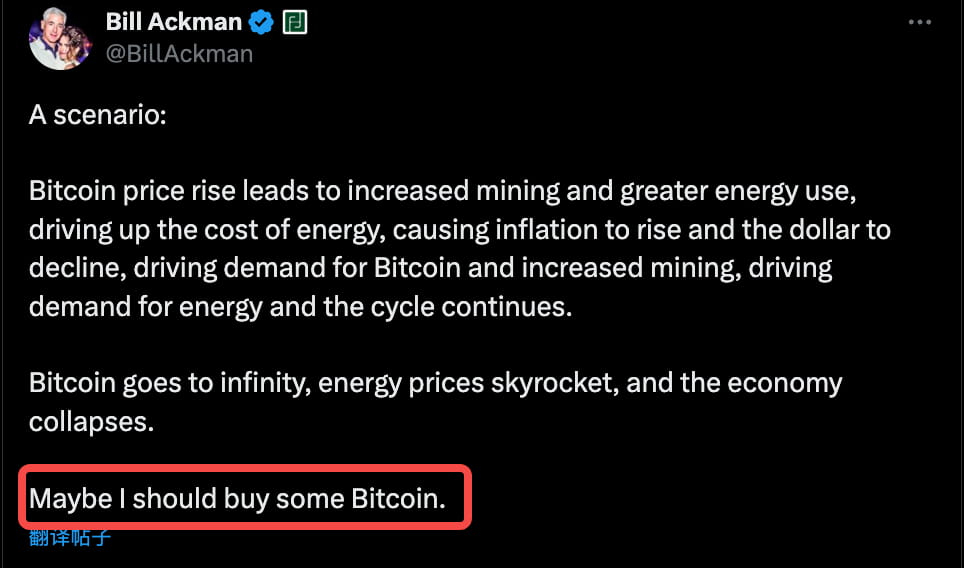
Besides Bitcoin, Ackman has recently been frequently discussing artificial intelligence. He has invested in several AI-related startups, though the specific names are kept confidential; interestingly, these emerging areas are also priorities for the Trump administration— Vice President Vance is a well-known tech supporter, and several Silicon Valley elites have entered the government.
Ackman's layout seems to be both a business judgment and a political stance.
Looking back, he has always been able to find the intersection of money and power. Where will the next battlefield be? Perhaps it is cryptocurrency regulation, or maybe AI.
But one thing is certain: when that battlefield appears, Bill Ackman will be suited up, waiting early to say to everyone: Hey, you're here.

